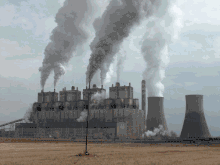Air pollution in Turkey
Air pollution in Turkey is the most lethal environmental issue in Turkey. An estimated 30,000 people die each year from air pollution-related illnesses,[1] about 8% of all deaths.[2] Air pollution is particularly significant in urban areas[3] especially Istanbul,[4] Ankara, Erzurum, and Bursa, where the combustion of heating fuels increases particulate density in winter. Almost all the urban population is exposed to particulate matter emissions higher than the EU and World Health Organization limits.[5] "Air pollution in urban centers, often caused by transport, and the use of small-scale burning of wood or coal, is linked to a range of health problems" and is one of the worst in the OECD according to a 2019 study by the Health Effects Institute. Although there is some monitoring of air pollution compared with other European countries, many air pollution indicators are not available.[6] Regulations in Turkey do not contain any restrictions on the pollutant PM 2.5, which causes lung diseases.[7] Researchers estimate that reducing air pollution to World Health Organization limits would save 7 times the number of lives that were lost in traffic accidents in 2017.[8] As of 2019 Turkey has not signed the Gothenburg Protocol.[9]

Sources of air pollution
Traffic
Especially in Istanbul, increased car ownership causes frequent urban smog conditions.[10] Increasing Turkey's proportion of electric cars in use to 10% by 2030 would have many benefits.[11] In 2019 about 45% of cars were over 10 years old and energy inefficient.[12]
Residential Heating
As of 2018 Turkish coal is still burnt for home heating in low-income districts of Ankara and some other cities.[13]
Coal-fired power stations
Greenpeace Mediterranean claim that the Afşin-Elbistan coal-fired plant is the power plant with the highest health risk in Europe, followed by the Soma coal-fired power plant, also from Turkey.[16][17]
Flue gas emission limits
In 2019 flue gas emission limits in mg/Nm3 (milligrams per cubic metre) for power stations under 50MW and those built before 2015 were:[18]
| Installed capacity of power plant | Dust | SO2 | NO2 | CO |
|---|---|---|---|---|
| 0.5 MW ≤ capacity < 5 MW | 200 | see cited source | see cited source | 200 |
| 5 MW ≤ capacity < 50 MW | 150 | see cited source | see cited source | 200 |
| 50 MW ≤ capacity < 100 MW | 100 | 2000 | 600 | 200 |
| 100 MW ≤ capacity < 500 MW | 100 | 2000 – 400 (linear decrease) | 600 | 200 |
| capacity ≥ 500 MW | 50 | 400 | 200 | 200 |
(see cited source for more details, such as some SO2 exceptions)
On 1st January 2020 flue gas emission limits in mg/Nm3 (milligrams per cubic metre) for all plants of 50MW and over (before then the limits only applied to plants built after 2015) became:[19]
| Size of power station | Dust | SO2 | NO2 | CO |
|---|---|---|---|---|
| 50 MW ≤ capacity < 100 MW | 50 | 850 | 400 | 150 |
| capacity ≥ 100 MW | 30 | 200 | 200 | 200 |
The limits are laxer than the EU Industrial Emissions Directive. The SO2 limit for large coal-fired power plants in India is 100 mg/m3 and in China is 35 mg/m3.[20]
Types
Particulates
As of 2017 PM2.5 is above World Health Organization guidelines[21] and is at dangerous levels in several cities.[22]
Volatile organic compounds
As of 2014 levels of volatile organic compounds (VOCs) in Istanbul were on average similar to those in London and Paris but more variable, with maxima usually exceeding 10 ppb.[23]
Persistent organic pollutants
The emission levels of persistent organic pollutants are not reported.[24]
Greenhouse gases
As of 2018 Turkey emits one percent of the world's greenhouse gas emissions.
Illness and deaths
Air pollution is a health risk due to burning fossil fuels,[25] and vehicle emissions.[26]
Average loss of life (due to excess PM2.5 compared to WHO guidelines) is estimated to be 0.2 years per person[27] but this will vary by location because, as of 2019, air pollution is severe in some cities.[28] It also increases the risk from respiratory infections, such as covid-19, especially in highly polluted cities such as Zonguldak.[29]
Istanbul
As of 2019 measured with the air quality index Istanbul's air affects the hearts and respiratory systems even of healthy individuals during busy traffic.[30]
Lack of monitoring
In many places the health effects of air pollution cannot be estimated, because there is not enough monitoring of PM10 and PM2.5 particulates.[31][32]
Economics
A study of 2015/16 hospital admissions in Erzincan estimated direct costs as 2.5% of the total health-related expenditures for the 15–34 and over 65 age groups, but stated that the total cost is likely much higher,[33] for example the economic costs of the reductions in the intelligence of adults[34] and children[35] have not been estimated. A 2018 study put the health benefits at over 2,800 premature deaths avoided per year[36] and a substantial increase in GDP because of reduced PM 2.5 air pollution in the country.[37][38] Although improved health would be the primary benefit of cutting air pollution in Turkey, because most of the air pollution is caused by burning fossil fuels a reduction of greenhouse gas emissions by Turkey would be a co-benefit; for example of low emission zones for city traffic, and replacing the distribution of free coal[39] with a different support for poor families.
Policy
The Climate Change and Air Management Coordination Board is responsible for coordination between government departments. As of 2019, however, according to the EU better coordinated policies need to be established and implemented.[40] The Turkish national electric car is planned to start production in 2022.
Opposition
Right to Clean Air Platform Turkey is among the organisations campaigning for cleaner air.[2]
Limits
As of 2019 ambient air quality and national emissions ceilings are not up to EU standards.[41]
Sources
- "Turkey 2019 Report" (PDF). European Commission. May 2019.
- The European environment — state and outlook 2020 (Report). European Environment Agency (EEA). 2019.
- Jensen, Genon K. (December 2018). Lignite coal – health effects and recommendations from the health sector (PDF) (Report). Health and Environment Alliance (HEAL).
- Saygın, Değer; Tör, Osman Bülent; Teimourzadeh, Saeed; Koç, Mehmet; Hildermeier, Julia; Kolokathis, Christos (December 2019). Transport sector transformation: Integrating electric vehicles into Turkey’s distribution grids (PDF). SHURA Energy Transition Center (Report).
References
- "Right to Clean Air Platform". Temiz Hava Hakkı. Retrieved 2019-09-24.
- Kara Rapor 2020: Hava Kirliliği ve Sağlık Etkileri [Black Report 2020: Air Pollution and Heath Effects] (Report) (in Turkish). Right to Clean Air Platform Turkey. August 2020.
- "Air pollution 'gravest environmental issue'". Hürriyet Daily News. Istanbul: Doğan Media Group. 1 January 2013. Retrieved 7 June 2013.
- Onat, Burcu; Sahin, Ulku Alver; Akyuz, Tanil (12 November 2012). "Elemental characterization of PM2.5 and PM1 in dense traffic area in Istanbul, Turkey". Atmospheric Pollution Research (published January 2013). 4 (1): 101–105. doi:10.5094/apr.2013.010. ISSN 1309-1042. OCLC 857474567.
- "How Turkey Can Ensure a Successful Energy Transition". Center for American Progress. Retrieved 19 February 2019.
- European Environment Agency (2013). Air pollution fact sheet 2013 - Turkey (Report). Retrieved 25 December 2015.
- "AIR POLLUTION AND ISTANBUL; Alarm bells". Heinrich Böll Stiftung.
- Hava Kirliliği ve Sağlık Etkileri KARA RAPOR (PDF). 11 May 2019. p. 56. Archived from the original (PDF) on 6 June 2019. Retrieved 11 May 2019.
- EEA (2019), p. 195
- "Fed up with Istanbul traffic". Retrieved 28 September 2018.
- "Transport sector transformation: Integrating electric vehicles into Turkey's distribution grids" (PDF).
- Saygın et al (2019), p. 16.
- Kadılar, Gamze Özel; Kadılar, Cem (2018). "Air pollution analysis for Ankara by air pollution index highly correlated with meteorological variables". AIP Conference Proceedings. 1991: 020014. doi:10.1063/1.5047887. Cite journal requires
|journal=(help) - "Bakan Dönmez: "Elektrikte artık arz güvenliği problemimiz kalmadı"". İhlas. 12 March 2019.
- "Calculation Of Turnover In Terms Of A Concession Agreement: The Board's Decision On The ERG Verbund Transaction". Mondaq. 17 December 2018.
- Üzüm, İpek (28 May 2014). "Greenpeace warns about threat of Turkey's coal-fired power plants". Today's Zaman. Istanbul: Feza Publications. Archived from the original on 26 December 2015. Retrieved 25 December 2015.
- Tuna, Banu (11 September 2014). "Greenpeace activists detained in Turkey for protesting thermal power plant". Hürriyet Daily News. Doğan Media Group. Retrieved 25 December 2015.
- "Emission standards: Turkey" (PDF). International Energy Agency.
- "SANAYİ KAYNAKLI HAVA KİRLİLİĞİNİN KONTROLÜ YÖNETMELİĞİNDE DEĞİŞİKLİK YAPILMASINA DAİR YÖNETMELİK". Resmî Gazete (29211): Appx 1 page 15. 20 December 2014. Archived from the original on 27 February 2019. Retrieved 22 February 2019.
- "Greenpeace analysis ranks global SO2 air pollution hotspots". Greenpeace International. Archived from the original on 2019-09-01. Retrieved 2019-09-01.
- EEA (2019), p. 199
- "World Health Organization report raises alarm about bad air in Turkish cities". Hürriyet Daily News. 15 February 2017.
- "Gaseous organic pollution in Istanbul megacity: composition and source apportionment during the TRANSEMED/ChArMEx experiment" (PDF). Cite journal requires
|journal=(help) - EEA (2019), p. 241
- "Six coal-fired plants continue to emit thick smoke after end of suspension". bianet. 2 July 2020.
- "Turkey: Air Pollution | IAMAT". www.iamat.org. Retrieved 2020-07-04.
- "The Air Quality Life Index (AQLI)". AQLI. Retrieved 2019-07-02.
- European Commission (2019), page 93
- Ugurtas, Selin (2020-04-17). "Coronavirus outbreak exposes health risks of coal rush". Al-Monitor. Retrieved 2020-04-18.
- "Understanding Vehicular Pollution – AQI, Harmful Effects and How to Reduce It?". News18. 1 March 2019.
- Kara Rapor 2020: Hava Kirliliği ve Sağlık Etkileri [Black Report 2020: Air Pollution and Heath Effects] (Report) (in Turkish). Right to Clean Air Platform Turkey. August 2020.
- "Report: Air pollution becoming more lethal in Turkey while scientists struggle to access data". Bianet. 13 August 2020.
- Unver, Edhem (2019). "The Effect of Air Pollution on Respiratory System Disease Admissions and Health Expenditures". Eurasian Journal of Medical Investigation. doi:10.14744/ejmi.2019.56609.
- Environment, U. N. (2018-10-11). "Air pollution linked to "huge" reduction in intelligence". UN Environment. Retrieved 2019-07-01.
- Trasande, Leonardo (2019-06-25). "Banning dangerous chemicals could save the US billions | Leonardo Trasande". The Guardian. ISSN 0261-3077. Retrieved 2019-07-01.
- Jensen (2018), p. 14.
- "Air Pollution and Health in Turkey Facts, Figures and Recommendations" (PDF). Health and Environment Alliance (HEAL). Archived (PDF) from the original on 22 August 2016. Retrieved 1 October 2018.
- "Pant by numbers: the cities with the most dangerous air – listed". The Guardian. 13 February 2017. Archived from the original on 23 February 2019. Retrieved 24 February 2019.
- HALİSÇELİK, Ergül (2017). "How to Deliver Free Coal to the Poor Families? Turkey Case" (PDF). Yönetim ve Ekonomi Araştırmaları Dergisi / Journal of Management and Economics Research.
- European Commission (2019), page 93
- European Commission (2019), page 93
External Resources
- Air Quality Map (Turkish)
- Turkey fact sheets European Environment Agency
- Right to Clean Air Platform Right to Clean Air Platform Turkey
| Wikimedia Commons has media related to Air pollution in Turkey. |
